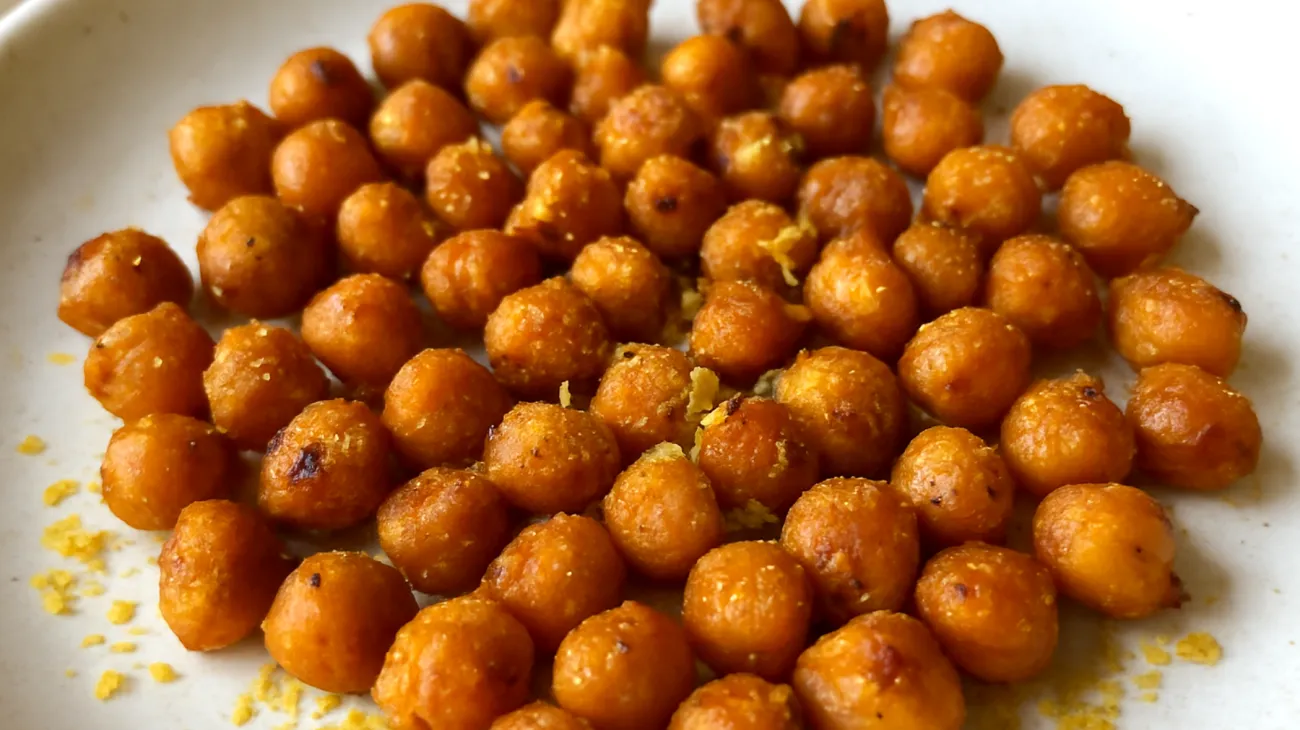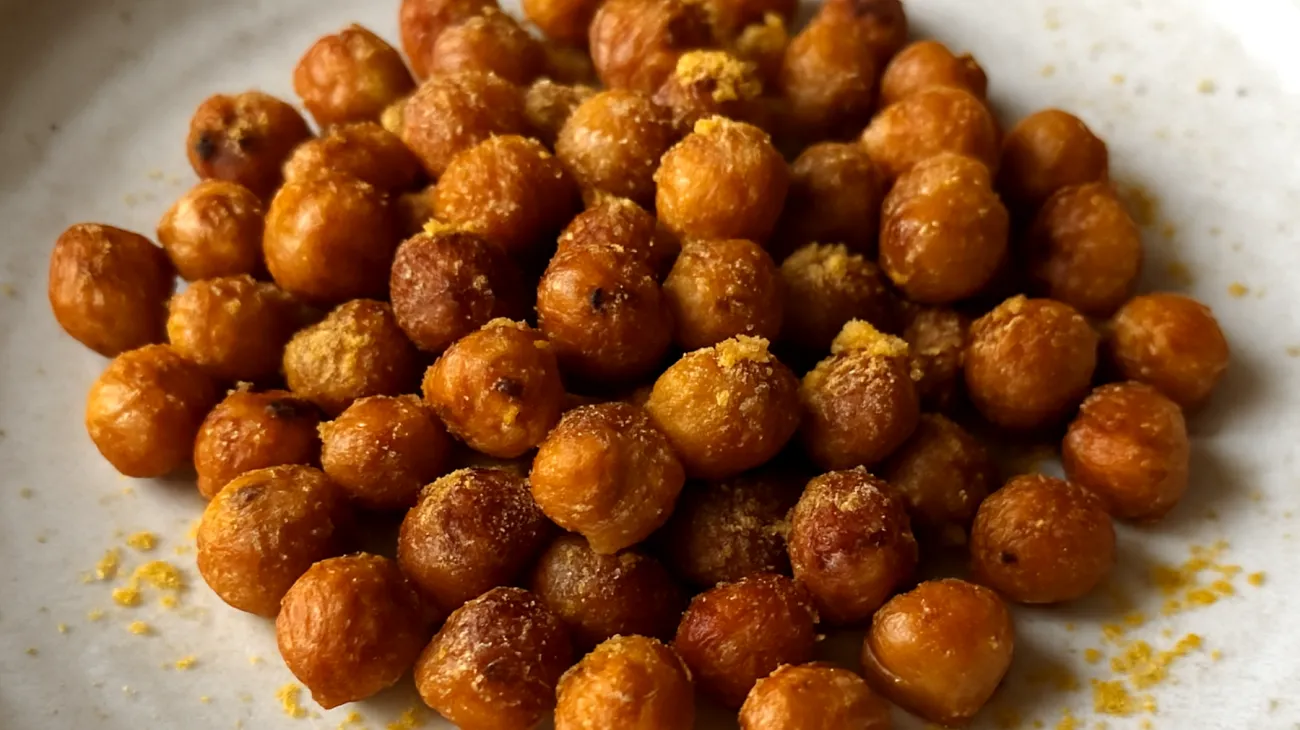Picture this: it’s 2 AM, your textbooks are scattered across the desk, and your stomach is growling louder than the air conditioning in your dorm room. While your roommate reaches for another bag of chips, you grab a handful of golden, crispy roasted chickpea clusters dusted with savory nutritional yeast. This isn’t just smart snacking—it’s strategic fuel for your academic success.
The Science Behind Smart Study Snacking
Your brain consumes about 20% of your daily energy intake—a well-established proportion confirmed by neuroscience research. While mental activity does fluctuate throughout the day, cognitive performance is most reliably supported by consistent, healthy nutrition paired with adequate sleep habits rather than emergency cramming fuel.
Unlike the quick sugar rush from conventional snacks that leads to blood glucose drops and decreased alertness, roasted chickpea clusters with nutritional yeast provide a more stable energy and nutrient profile. When roasted, chickpeas offer a blend of protein, fiber, and slow-digesting carbohydrates that support steady energy release throughout your study sessions.
Nutritional Powerhouse in Disguise
A typical 1/3-cup serving of roasted chickpeas supplies about 6-8 grams of plant-based protein. While chickpea protein alone isn’t classified as complete, combining it with nutritional yeast creates a more comprehensive amino acid profile that rivals many animal-based snacks. This protein content helps moderate blood glucose response, reducing the risk of energy crashes that derail concentration.
The complex carbohydrate structure of chickpeas makes them particularly valuable for sustained mental work. Research shows these carbs digest slowly, releasing glucose over 2-3 hours, helping maintain cognitive function during extended study periods. This steady fuel supply keeps your mind sharp when tackling challenging coursework or memorizing detailed information.
Nutritional yeast transforms this snack into a micronutrient powerhouse. It’s an excellent source of B-vitamins, particularly thiamine and riboflavin, essential for brain function and nervous system health. When fortified, nutritional yeast also provides vitamin B12, a crucial nutrient often lacking in student diets due to irregular eating patterns.
Mineral Wealth for Mental Performance
Chickpeas deliver substantial amounts of folate, iron, and magnesium—minerals directly linked to cognitive performance. Folate plays a crucial role in neurotransmitter synthesis, supporting mood regulation and mental clarity. Iron ensures optimal oxygen transport to brain tissue, while magnesium modulates stress response and promotes relaxation without compromising alertness.
Each serving provides approximately 4-6 grams of fiber, combining both soluble and insoluble types. This fiber content contributes to satiety, preventing the mindless snacking that often accompanies exam stress. While research continues to explore fiber’s relationship with mood, adequate intake supports overall well-being and may help reduce stress-related eating behaviors.
Practical Preparation for Busy Students
The beauty of roasted chickpea clusters lies in their batch-preparation potential. Transform a single weekend afternoon into a week’s worth of nutritious snacking. Simply drain and rinse canned chickpeas, pat them completely dry, toss with olive oil and nutritional yeast, then roast at 400°F for 20-25 minutes until golden and crispy.

Store these clusters in airtight containers where they maintain their satisfying crunch for up to seven days. Pre-portion them into 1/3 cup servings using small containers or resealable bags. This approach prevents overconsumption while ensuring consistent energy distribution throughout your study schedule.
Strategic Consumption Tips
Proper hydration amplifies the benefits of this fiber-rich snack. The following preparation and consumption guidelines help maximize their effectiveness:
- Consume each portion with at least 8 ounces of water to aid digestion
- Time portions between main meals, particularly during afternoon energy dips
- Start with smaller amounts if you’re new to legume consumption
- Allow your gut microbiome to adapt gradually over several days
Students new to legume consumption should introduce these clusters gradually. Starting with smaller portions every other day allows your digestive system to adapt to the increased fiber intake. This measured approach prevents temporary digestive symptoms like bloating or gas, which are normal adjustment responses but might otherwise discourage continued consumption.
Beyond Basic Nutrition
The value of roasted chickpea clusters extends beyond their nutritional profile. Mindful food preparation serves as a stress-relief activity, providing a meditative break from academic pressures. The satisfying crunch engages multiple senses, creating a more fulfilling snacking experience that may promote better satiety than softer, highly processed alternatives.
Economic advantages make this snack particularly appealing for budget-conscious students. A single can of chickpeas, typically priced below two dollars, yields several servings—delivering exceptional nutritional value per dollar compared to packaged snack alternatives. This cost-effectiveness allows students to maintain healthy eating habits without straining limited budgets.
Experiment with flavor variations to maintain interest and enhance health benefits. Try these combinations to keep things interesting:
- Curry powder and turmeric for anti-inflammatory properties
- Smoked paprika for antioxidants and smoky flavor
- Garlic powder for cardiovascular health support
- Cumin and chili powder for metabolism-boosting benefits
Smart nutrition choices during university years establish patterns that extend far beyond graduation. Research consistently links nutrient-dense dietary habits with better long-term cognitive health and professional productivity. By choosing options like roasted chickpea clusters with nutritional yeast, you’re investing in both immediate academic performance and future cognitive resilience that will serve you throughout your career. Your future self will thank you for building these healthy habits now, when every study session counts toward your academic success.
Table of Contents

